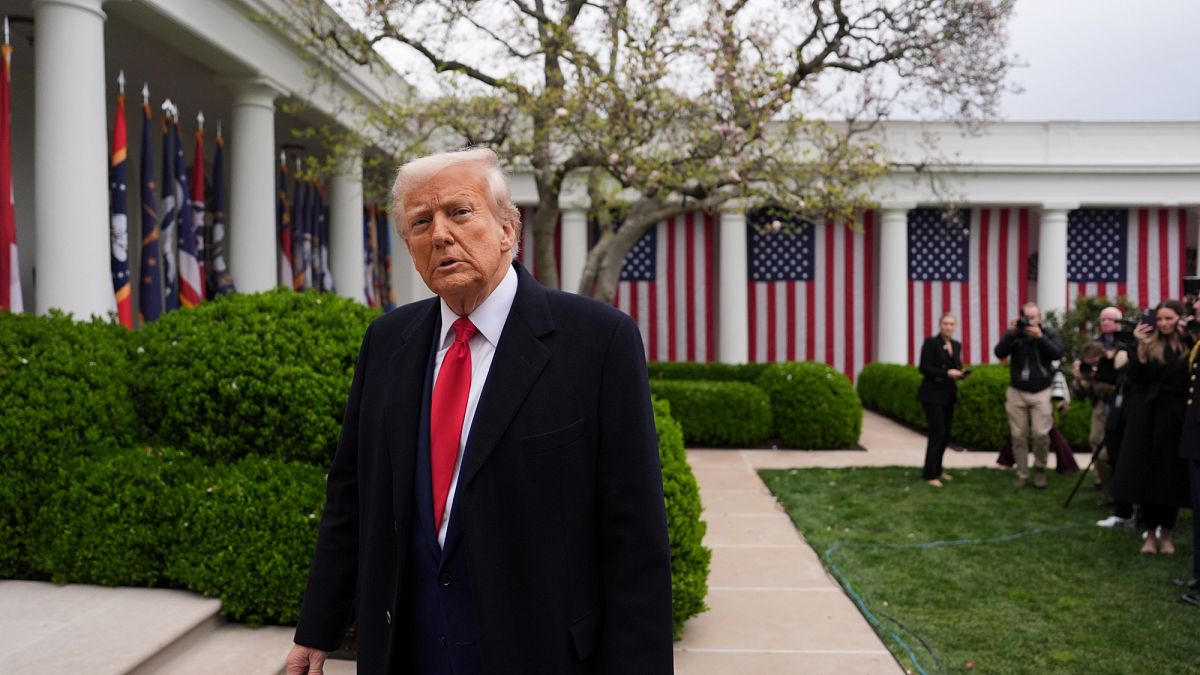US President Donald Trump said that he would be open to negotiating with other countries for “phenomenal” offerings. “If somebody said that we’re going to give you something that’s so phenomenal, as long as they’re giving us something that’s good,” he told reporters aboard Air Force One on Thursday.
His comments came after several White House officials insisted that the newly announced reciprocal tariffs were not negotiable, fuelling further uncertainties about the US president’s tariff plans, which sent global stock markets plunging and wiped out roughly $2 trillion (€1.8 trillion) in the S&P 500 on Thursday.
The “Liberation Day” tariff announcement spooked global markets as investors feared that an all-out global trade war could tip the world economy into a recession or even a 1920s-style Great Depression. Trump announced reciprocal tariffs targeting 180 nations the day before, with a scope and scale not seen in a century. Despite the chaos, Trump insisted that the economic impact would be only temporary and that stock markets “are going to boom.”
“…Policy uncertainty is unlikely to recede any time soon and is likely to continue to cloud the outlook for some time to come – harming both business and consumer sentiment while also making it impossible for market participants to price risk,” Michael Brown, a senior research strategist at Pepperstone London, wrote in a note.
On Wednesday, Trump announced a 10% baseline tariff on all countries, with additional import levies on some nations considered offenders. The White House confirmed that the 10% baseline tariffs would take effect on 5 April, while reciprocal levies would kick in on 9 April, leaving little time for negotiations.
Wall Street posts worst day since 2020
US stock markets suffered an intense selloff not seen since 2020, when COVID-19 caused worldwide lockdowns and business closures. The Dow Jones Industrial Average nosedived more than 1,600 points, or 3.98%, the S&P 500 plunged 4.84%, and the tech-heavy Nasdaq Composite plummeted 5.97%.
Among big tech stocks, Apple led losses, slumping 9.25% due to concerns about tariff disruptions to its supply chains and global sales, particularly in China. On top of existing 20% tariffs, the nation will now face 54% import levies from the Trump administration. Beijing vowed to take “resolute countermeasures” in response to the reciprocal tariffs. Shares of Amazon and Meta Platforms both plunged 9%, while Nvidia fell 7.8%. Other technology stocks in the Magnificent Seven group were all down between 2% and 6%. Retailer stocks, such as Nike, Lululemon, and Ralph Lauren, were also among the worst performers, falling 14.4%, 9.6%, and 16.3%, respectively.
The US dollar weakened significantly against other currencies in the G10 group as investors and traders offloaded their US assets. The dollar index plunged below 102, its lowest level since October 2024. Meanwhile, haven currencies, including the euro, the Japanese yen, and the Swiss franc, strengthened significantly.
US government bonds surged due to the risk-off sentiment. The yield on the 10-year Treasury note fell 9 basis points to 4.04%, as bond prices move inversely to yields. Expectations of further central bank interest rate cuts and surging haven demand may continue to push bond prices higher. Alongside the bond rally, gold also gained despite retreating from its intraday high.
European luxury stocks plummet
European stock markets also closed in a sea of red on Thursday, with the pan-European Stoxx 600 sliding 2.7%, the DAX slumping 3.01%, and the CAC 40 falling 3.31%. Trump’s announcement of a 20% tariff on goods from the European Union sparked turmoil. In response, French President Emmanuel Macron urged European businesses to suspend investments in the US.
European luxury goods stocks, including LVMH, Hermès, Richemont, and Kering, slumped 5.62%, 3.51%, 6.32%, and 7.51%, respectively. Adidas plunged nearly 12% due to its broad exposure to global markets. The US is a major market for these European luxury brands, with tariffs expected to significantly impact sales.
Additionally, automaker stocks continued to suffer from the tariff impact, as the 25% auto tariffs took effect on Wednesday. Volkswagen shares fell 4.42%, BMW declined 3.55%, and Porsche slid 3.06%.

